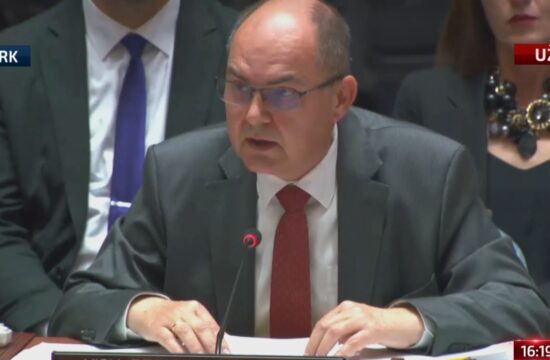
Croatia's health authorities reported forty new cases of Covid-19 on Monday afternoon, bringing the country's total count to date to 1,222. The 3.4 percent increase from Sunday marks the country's lowest 24-hour increase in cases since the outbreak began in February.
The latest case count includes one new death, bringing the death toll to 16. The total also includes 372 people who are currently hospitalised, including 36 people in intensive care. Another 130 people have fully recovered.
Nearly 30 percent of all cases to date have been detected in the capital Zagreb, which hold about a fifth of the country's entire 4 million population and which had been hit by a 5.3-magnitude earthquake on March 22.
“Unfortunately, we have one more person who died at the Infectious Diseases Hospital (in Zagreb). The patient was a middle-aged man who did not have any underlying conditions,” Health Minister, Vili Beros, told reporters on Monday afternoon.
Beros added that more than 11,400 samples had been tested for the novel coronavirus to date, including more than 600 over the past 24 hours.
In the aftermath of the earthquake, the government moved to ban nearly all travel between cities and across municipality lines as it was feared that aftershocks in the following days might drive Zagreb residents – many of whom own summer homes on Croatia's Adriatic coast – to flee the city and inadvertently spread the new coronavirus to other parts of the country.
Last week, a system of online-issued travel passes was introduced, allowing people to apply to travel freely outside their place of residence. Interior Minister, Davor Bozinovic, said on Monday that 565,000 these passes have been issued to date. The passes are available to people exempt from the ban, such as home carers, emergency workers, or people who must travel across city borders for essential work.
Bozinovic also announced that some parts of farmer's markets – closed by decree last month – might re-open in the coming days.
Slovenia: Case count passes 1,000; national reserves deliver 66 ventilators
In neighbouring Slovenia, authorities reported two more Covid-19 fatalities who had died on Sunday, bringing the tiny Alpine nation's death toll to 30. Confirmed infections rose by 24 to total 1,021 on Monday. A total of 114 Slovenians are currently cared for by hospitals, including 30 in intensive care.
Slovenia has been getting medical equipment to prepare for a possible surge in cases over the past several weeks, and its national reserves agency last week distributed 66 new ventilators to local hospitals, as well as 2.2 million protective masks. Ljubljana government had also placed an order for additional 570 ventilators.
A manufacturer of industrial safety apparel based in the town of Celje, Prevent & Deloza, switched to producing masks, and is expected to deliver about 500,000 protective masks this week alone, and Austrian-based textile company Wolford, best known for making women's lingerie and hosiery, also announced last week its two factories in Austria and Slovenia would switch to making medical masks.
Serbia: Case load passes 2,000, death toll at 58
In Serbia, health authorities reported 292 new cases on Monday, a 15 percent daily increase, making its total to date 2,200, the highest in the region.
The case load nearly tripled over 8 days from the Monday before, when it stood at 785, and this was the seventh day in a row when authorities reported a triple-digit daily increase. The latest figures also include 58 deaths, including seven reported over the last 24 hours.
Serbia had introduced one Europe's strictest set of restrictions, including a nationwide 12-hour curfew rolled out on March 19, and the country's military taking over the management of all hospitals and border crossings.
The Minister for European Integration, Jadranka Joksimovic, said on Monday that Hungary had sent 200,000 masks and 10,000 protective suits to Serbia, and on Sunday head of the Chinese team which arrived last month to help Serbia combat the epidemic, Peng Zhiqiang, praised government efforts to contain the spread of the disease.
Bosnia: 27th death reported; Malaysia to send 2m masks
In Bosnia, the latest case count on Monday stood at 668, including 27 deaths. Nearly 30 percent of all cases are in the major city of Banja Luka, which is also the capital of the ethnic Serb-dominated half of the country called Republika Srpska.
After Bosnia had received medical supplies and equipment from Serbia last week, and a first batch of coronavirus tests donated by the European Union, donations are pouring in to help Bosnia's hospitals combat the epidemic. The latest includes 12,000 protective masks donated by an association of Chinese expats living in Bosnia and Malaysia's announcement that it would send 2 million masks to Bosnia.
Also on Monday, the Bosniak and Croat members of the country's tripartite presidency, Sefik Dzaferovic and Zeljko Komsic, laid wreaths at several memorials around capital Sarajevo to mark the 75th anniversary of the city's liberation in World War II. Bosnia's most famous footballer, Edin Dzeko, currently a member of Italian club Roma, also congratulated the anniversary to Sarajevans.
Elsewhere in the region, North Macedonia confirmed a total of 555 cases on Sunday, including the country's 18th fatality. The country's Health Minister, Venko Filipce, said on Facebook that 23 Macedonians have fully recovered to date. 74 patients have been hospitalised, including 15 in intensive care units.
Montenegro, which was the last European country to confirm its first case of the disease, on March 17, reported a total of 223 cases as of Monday, including two deaths. Over the previous 24 hours, nine cases have been detected, all in the capital Podgorica. Montenegro had joined the list of countries with sweeping restrictions on public life last month, including a 10-hour daily curfew introduced last Monday.
Follow N1 via mobile apps for Android | iPhone/iPad | Windows| and social media on Twitter | Facebook.




